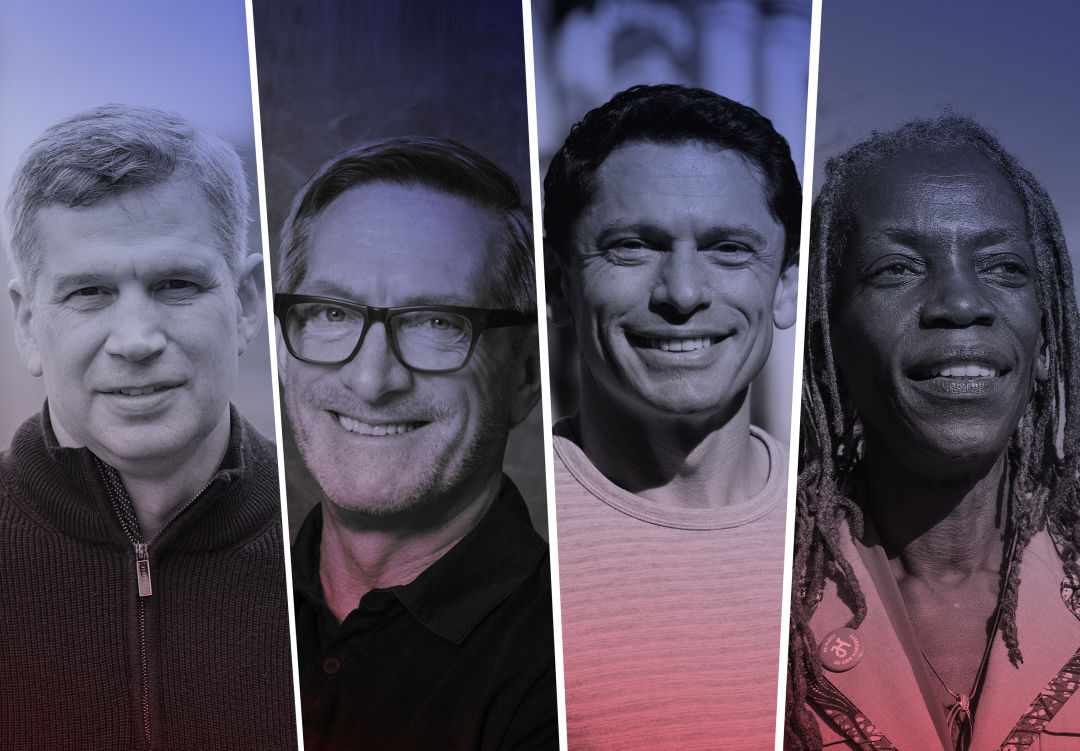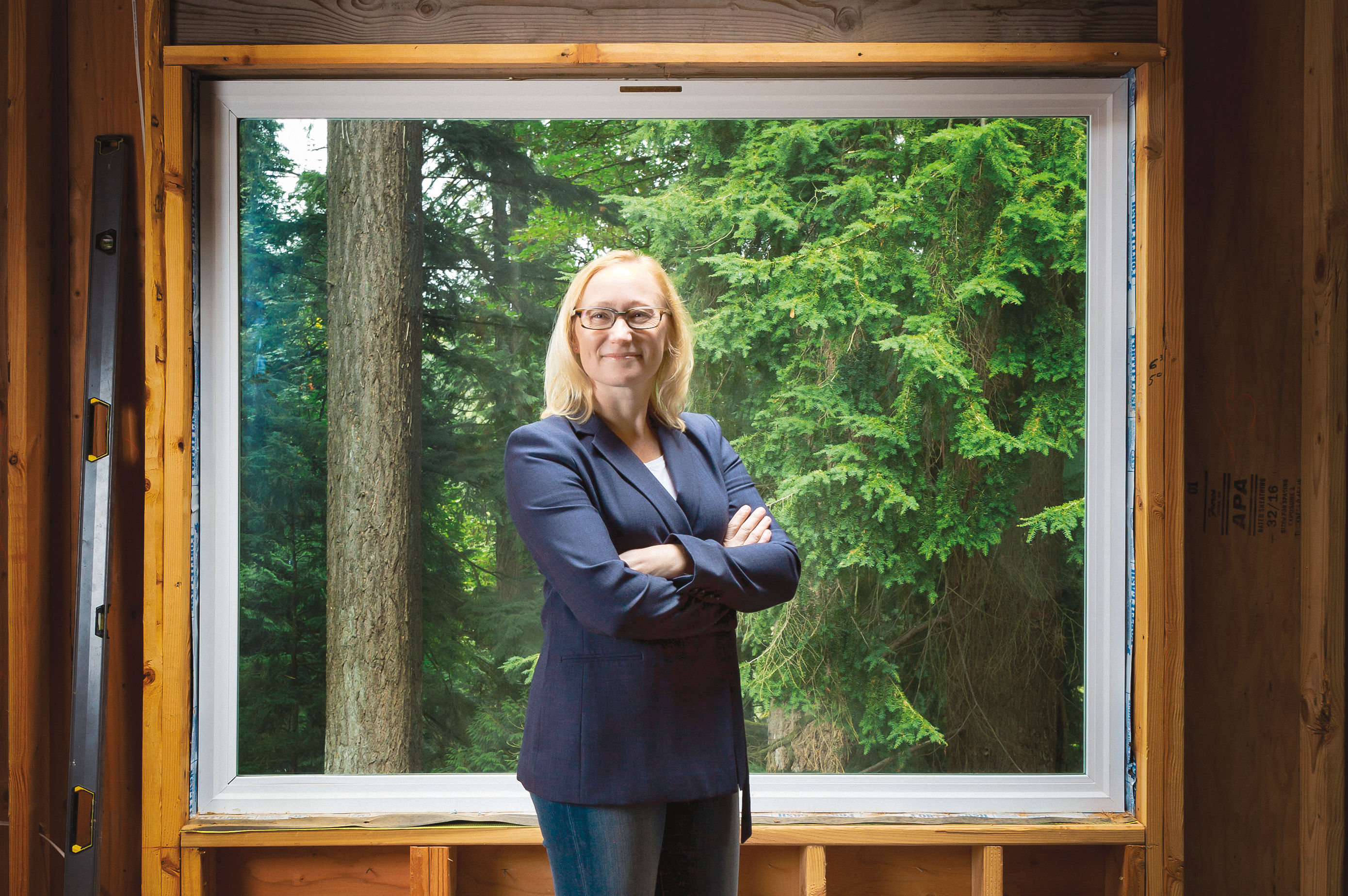Who Is Donating in Portland City Council Elections?

City council candidates Rene Gonzalez, Dan Ryan, Vadim Mozyrsky, and Jo Ann Hardesty have all been certified by the city’s Small Donor Elections program.
The primary election for two seats on Portland City Council isn’t until May 17, but fundraising season has been in full swing for a while, and the city’s public financing program dropped its first matching funds into candidate coffers in December. So far, the four candidates certified in the Small Donor Elections program have gotten between $80,000 and $110,000 each in matching public funds, putting them closer to equal footing, funding-wise.
That doesn’t mean they’ve raised the same amount. Position 3 incumbent Jo Ann Hardesty might slightly trail two of her challengers in fundraising, but she has a good share of small donations from Portland residents—those get the most bang for the buck in terms of matching funds. The latest version of the city’s numerous attempts to establish a public funding system for campaigns to make elected office and political participation more accessible, the Small Donor Elections program provides matching funds at a 9-to-1 ratio on a Portland donor’s first $20. It also caps individual contributions at $250 and bars contributions from business entities.
As of last week, only about a quarter of the money Hardesty has raised from donors for this year’s election has come from people donating the maximum $250, while more than half the money raised by her two funded challengers has come from people giving the max. For the incumbent in position 2, Dan Ryan, about two-thirds of the money he’s raised has come from people donating the max—perhaps not a surprise for someone whose professional background covers a lot of fundraising for schools and arts organizations.
While the program is designed to amplify the voice of the little guy—instead of candidates trying to land that big check from a few millionaires, they’re looking to get as many small donations as they can from Portland residents—there are still a lot of big names on the donor lists. They include prominent developers, famous Portland families (including, in one case, a candidate’s own), multigenerational political dynasties, and election winners and losers of years past.
All the city council candidates who say they’re planning to raise money have noted their intent to participate in the program (the rules can shift if an opponent opts out), but they have to show a certain number of donations from Portland residents and go through a mandatory training before they’re certified to receive funds. Besides the incumbent, Hardesty, two others in the race for the no. 3 commissioner seat have been certified to receive matching funds: Vadim Mozyrsky, an administrative law judge; and Rene Gonzalez, an attorney and tech company owner.
Hardesty, a former state legislator elected to city council in 2018, has seen donations so far from fellow commissioner Carmen Rubio and Southeast Portland State Rep. Rob Nosse, both of whom have also donated to Ryan, the incumbent for position no. 2. Nosse’s fellow Rep. Khanh Pham and Portland Public Schools board chair Michelle DePass have donated to Hardesty, as have Metro president Lynn Peterson and newly appointed Metro councilor Duncan Hwang, Switchboard community consulting founder Mara Zepeda, former mayoral candidates Sarah Iannarone and Jefferson Smith, recent Metro Council candidate Chris Smith, and civil injury attorney Jason Kafoury (cousin of Multnomah County chair Deborah Kafoury).
There’s also Baruti Artharee, a former mayoral aide who left city hall amid controversy and who sued Hardesty’s opponent in a 2018 runoff for defamation. Mozyrsky’s donor list also features a familiar name for longtime local election watchers: Vanessa Sturgeon, who was indicted in 2004, along with her grandfather Tom Moyer, a real estate developer, on a felony charge of making a contribution in a false name in that year’s mayoral race. Charges were thrown out in 2005, but state appeals went on for years, with the case finally dropped in 2011.
Other familiar names on Mozyrsky’s donor list include multiple members of the Downtown Development Group’s Goodman family (Mark, Matthew, Greg, Stephen, and Whitney) and other downtown property and business owners; owners of the Mark Spencer Hotel, the Fields Bar, and Papa Haydn; beer distributor Rob Maletis; artist-friendly landlords David Gold and Ken Unkeles; PPS board member Gary Hollands; and two different Kafourys, commercial real estate exec Trevor and former state legislator/PPS board member Stephen (cousin and father, respectively, of county chair Deborah).
Gonzalez’s list also has a Maletis (Rob’s nephew John, founder of a private jet management company), but he also has donations from more than 20 of his own relatives, including aunts, uncles, cousins, cousins’ spouses, and more in the extended Jubitz family. (Gonzalez’s maternal grandmother, Frances “Bunny” Wilson Jubitz, was married for 44 years to Monroe “Moe” Jubitz, founder of the Jubitz Corporation and legendary North Portland truck stop. A la The Brady Bunch, they each had three children from a previous marriage.) Most of Gonzalez’s out-of-state contributors are family members; only donations from Portland residents can be matched under the Small Donor Elections program.
James and Anne Crumpacker, whose names grace some spaces at the Portland Art Museum (as does the name Jubitz, and Anne’s mother’s name from her second marriage, to William Swindells of Willamette Industries) and who donated generously to their son’s campaign to replace US Rep. Greg Walden in the 2020 Republican primary, bring in another prominent Portland family. So do donations from George W. Bush–era US Ambassador to New Zealand and Samoa Charles Swindells and wife Caroline, whose names are on a foyer at the art museum. (Charles is from a different line of Swindells—his father and grandfather were both prominent Portland attorneys.)
Gonzalez has also received donations from members of Opening Schools PDX, a Facebook group he cofounded that has advocated since fall 2020 for the return of in-person learning after so many school districts went remote in the pandemic.
For the no. 2 position, only Dan Ryan, who joined the council in 2020 after a special election following the death of Commissioner Nick Fish, has been certified so far for matching public funds. A onetime PPS board member himself, he’s attracted donations from current and former PPS board members Andrew Scott, Amy Kohnstamm (and husband Kevin Kohnstamm, whose father resurrected Timberline Lodge), Matt Morton, David Wynde, Pam Knowles, and Ruth Adkins. In addition to Rubio, his fellow commissioner Mingus Mapps has donated, as well as former elected officials Jim Francesconi, Mike Lindberg, Amanda Fritz, Maria Rojo de Steffey, and Chip Shields. There’s also developer Homer Williams, Oregon Historical Society executive director Kerry Tymchuk, Peter Bragdon of Columbia Sportswear, former Bank of America VP Monique Barton, Timbers/Thorns president of business Mike Golub, River Pig Saloon owner Ramzy Hattar, and art gallery founder Theo Downes-Le Guin (son of Ursula). Ryan shares some Goodman donors, Trevor Kafoury, and attorney Steve Janik with Mozyrsky—in fact, Ryan shares roughly 50 donors with Mozyrsky.
Akasha Lawrence Spence, a familiar face in Salem after having been appointed twice to complete the term of a west-side state legislator (first Jennifer Williamson’s in 2020 and now Ginny Burdick’s), announced her candidacy for Ryan’s seat in November but dropped her bid in January. Two filed candidates also withdrew, while two who remain (Equitable Giving Circle cofounder AJ McCreary, who entered the race January 14, and Michael Simpson) have filed a notice of intent to participate in the program but have not submitted qualifying donations yet.
Before December 13, the match was 6-to-1 on a Portland donor’s first $50, so candidates who took in qualifying donations of $50 or more last fall could get $300 in matching funds. The change to a 9-to-1 ratio on the first $20 (for a $180 match) was among the recommendations in an August 2021 city report on the program’s use in the 2020 mayoral and city council elections. The report found that the “average contribution per donor decreased from $1,221 in 2016 to $81 in 2020 and the median contribution per donor from $250 to $50,” and found “lower- income neighborhoods in North, Northeast, and East Portland gave more than in previous elections, reducing the disparity between them and the wealthier areas in the city’s core.”




